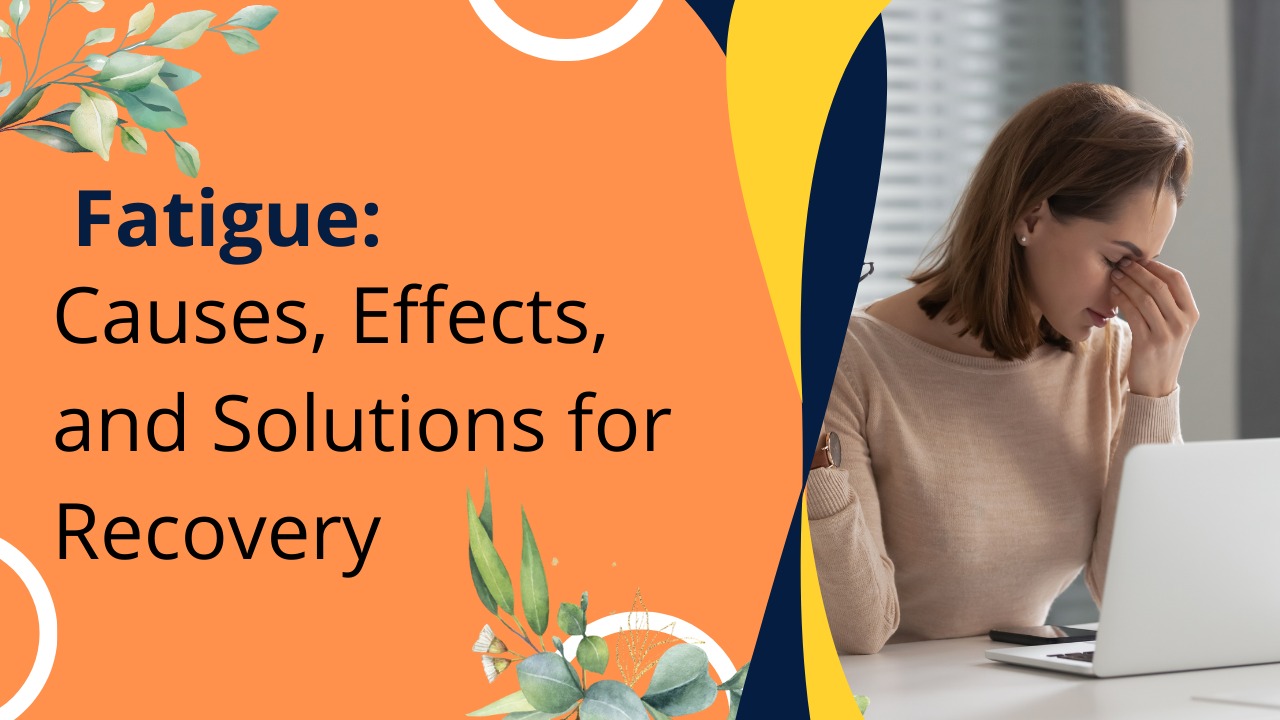Fatigue is a feeling of extreme tiredness, either physically, mentally, or both, that can lower a person’s ability to perform daily tasks. It often happens after long periods of physical activity, lack of sleep, or ongoing stress. While it is a common experience for many, it should not be ignored, especially if it lasts for a long time or affects quality of life.
There are different types of fatigue, such as physical fatigue, which makes the body feel weak or sore, and mental fatigue, which causes trouble with focus and memory. Fatigue can also be a symptom of medical conditions like anemia, thyroid issues, or depression. Knowing the type of fatigue can help identify the root cause.
Managing fatigue involves improving sleep habits, reducing stress, staying active, and eating well. In some cases, medical help may be needed. By recognizing the signs early, people can take steps to feel more energetic and balanced.
What is Fatigue ?

Fatigue is a strong feeling of tiredness or low energy that doesn’t go away with rest. Unlike regular tiredness that improves after sleep or a break, fatigue continues and can affect how a person functions. It may make simple tasks feel more difficult and can lower focus, motivation, and strength.
This condition can show up as physical exhaustion, mental weariness, or a mix of both. Some people may experience it for a short time, while others may face it for weeks or even longer. Fatigue can disrupt daily routines, reduce productivity, and impact overall well-being. In some cases, it may be linked to an illness or ongoing stress. Recognizing the signs early and taking steps to manage fatigue can help improve energy and quality of life.
Physical Fatigue
Physical fatigue is a feeling of tiredness or lack of energy that comes from doing too much physical work or exercise over time. It happens when the muscles, joints, and body are pushed beyond their limits, leading to exhaustion. People experiencing physical fatigue often feel muscle soreness, general weakness, and find it harder to carry out tasks that need strength or movement. Recovery usually requires proper rest, hydration, and nutrition to restore energy levels.
Mental Fatigue
Mental fatigue, also known as cognitive fatigue, happens after long periods of thinking, focusing, or dealing with stress. It affects the brain’s ability to function properly and can lead to trouble concentrating, forgetfulness, low motivation, and reduced alertness. Mental fatigue is often caused by working too much, emotional strain, or not getting enough sleep. Though it may not show in physical ways, it can be just as limiting as physical fatigue.
Types of Fatigue
Fatigue can be broadly classified into several types based on its causes and effects. Each type has unique characteristics and requires different approaches to manage.
Acute Fatigue
Acute fatigue is a temporary and short-term feeling of tiredness that usually happens after a period of intense physical or mental activity. It can occur after things like a hard workout, staying up all night studying, or going through a particularly demanding or stressful week. This kind of fatigue is the body’s normal way of signaling that it needs rest to recover. It usually goes away on its own with proper sleep, relaxation, and a break from the activity that caused it.
Chronic Fatigue
Chronic fatigue is a long-term and more serious form of exhaustion that lasts for months or even years. It does not go away with normal rest or sleep and can greatly affect a person’s ability to carry out daily tasks. In some cases, it is referred to as Chronic Fatigue Syndrome (CFS), which can be linked to several health problems such as immune system issues, infections, or hormonal imbalances. It may also be related to conditions like fibromyalgia, sleep apnea, or depression. Managing chronic fatigue often requires medical attention and lifestyle changes.
Sleep-Deprivation Fatigue
This type of fatigue results from not getting enough sleep or having poor-quality sleep over time. Sleep is essential for the body to repair, recharge, and perform well both mentally and physically. When sleep is consistently disrupted or lacking, it can cause serious problems such as difficulty thinking, mood swings, irritability, and even a weakened immune system. Sleep-deprivation fatigue can be improved by developing good sleep habits and addressing any sleep-related issues.
Emotional Fatigue
Emotional fatigue comes from dealing with long periods of emotional stress, such as going through personal grief, caring for someone with serious health problems, or facing ongoing pressure in life. It can make people feel emotionally drained, distant, and unable to feel motivated. This type of fatigue often overlaps with mental fatigue and may lead to both physical symptoms (like tiredness or headaches) and psychological ones (such as sadness or anxiety). Taking time to care for emotional well-being is important in reducing emotional fatigue.
Causes of Fatigue
Fatigue can be triggered by a wide range of factors, both physical and psychological. These causes can be classified into lifestyle-related causes, medical conditions, and environmental factors.
Lifestyle Factors

Lack of Sleep
One of the leading causes of fatigue is not getting enough quality sleep. Sleep is vital for both the body and brain to rest, repair, and function properly. Without enough restful sleep, a person may feel constantly tired, have trouble focusing, and experience slower physical responses. Poor sleep patterns over time can seriously affect overall health, leading to long-term exhaustion and reduced mental clarity.
Physical Activity
Exercise plays an important role in staying healthy, but too much physical activity without giving the body time to recover can lead to fatigue. On the other hand, not getting enough movement—such as sitting for long periods or not exercising at all—can also make the body feel sluggish. A lack of physical activity may cause the body to lose its ability to use energy efficiently, making even simple tasks feel tiring.
Poor Diet
Eating a balanced and nutritious diet is key to maintaining good energy levels. When the body doesn’t receive the right mix of nutrients—especially vitamins, minerals, and water—it can lead to a feeling of tiredness. For example, low levels of iron, vitamin B12, or vitamin D may result in conditions like anemia, which often causes low energy and fatigue. Eating too much processed food or skipping meals can also contribute to feeling drained.
Stress
Ongoing stress can wear out both the mind and body. When you’re constantly under pressure, your body releases stress hormones like cortisol. While helpful in short bursts, too much cortisol over a long period can lead to feelings of exhaustion. Stress can also affect sleep, appetite, and mood, all of which play a role in how much energy you have each day.
Medical Conditions
Certain medical conditions can cause chronic fatigue as one of their primary symptoms. Some of these include:
Anemia
Anemia is a condition where the body does not have enough healthy red blood cells or hemoglobin to carry oxygen efficiently to the tissues. Without enough oxygen, the body’s muscles and organs struggle to function properly, leading to persistent tiredness and weakness. This can make even simple daily tasks feel difficult and draining.
Thyroid Disorders
Problems with the thyroid gland can affect energy levels. In hypothyroidism, the thyroid produces too little hormone, which slows down body processes and causes fatigue, weight gain, and cold sensitivity. In hyperthyroidism, the gland produces too much hormone, which can lead to tiredness due to overstimulation, along with restlessness, rapid heartbeat, and weight loss. Both conditions can cause ongoing fatigue if not properly treated.
Sleep Disorders
Sleep-related conditions such as sleep apnea, insomnia, and narcolepsy can greatly disturb a person’s sleep quality. Sleep apnea causes breathing interruptions during the night, while insomnia makes it hard to fall or stay asleep. Narcolepsy can lead to sudden daytime sleepiness. These disorders prevent restful sleep, resulting in constant fatigue throughout the day.
Diabetes
When diabetes is not well-managed, blood sugar levels can swing too high or too low. These fluctuations can leave the body feeling drained of energy. High blood sugar can slow circulation and damage cells, while low blood sugar can cause shakiness, confusion, and extreme tiredness. Consistent energy levels are hard to maintain without proper control of blood sugar.
Heart Disease
When the heart is not pumping blood effectively, the body may not get enough oxygen-rich blood to meet its needs. This can result in a constant sense of exhaustion, especially during physical activity. People with heart disease may feel tired easily, even during mild exertion, due to poor blood flow and reduced oxygen delivery.
Chronic Fatigue Syndrome (CFS)
CFS is a serious and long-lasting condition where individuals feel extremely tired for no clear reason. The fatigue doesn’t improve with rest and can last for months or even years. It often limits daily activities and may be accompanied by other symptoms like muscle pain, poor concentration, and unrefreshing sleep. The exact cause of CFS is still unknown, making it difficult to treat.
Environmental Factors

Climate and Weather
Environmental conditions such as extreme temperatures—whether very hot or very cold—can place added stress on the body. High humidity can make it harder to cool down, while poor air quality can make breathing more difficult. These factors can lead to quicker physical exhaustion, especially when combined with outdoor activity. Over time, continued exposure to harsh weather conditions can result in fatigue and lower energy levels.
Pollution
Living in areas with high pollution levels can contribute to tiredness. Airborne toxins, chemicals, and poor indoor air quality can strain the body’s natural detox systems, especially the lungs and liver. The body has to work harder to eliminate these harmful substances, which can cause feelings of sluggishness, low energy, and overall fatigue. This can be especially problematic for individuals with allergies, asthma, or other respiratory issues.
Work Environment
A demanding or stressful work setting can play a major role in causing fatigue. Working long hours without adequate breaks, dealing with high workloads, or facing constant pressure can lead to mental and physical burnout. Lack of proper rest, uncomfortable workspaces, and poor work-life balance can also leave a person feeling constantly drained and unable to recover fully, even after sleep. Over time, this can significantly impact overall health and performance.
Symptoms of Fatigue
Fatigue can manifest in a variety of ways, depending on its severity and underlying causes. Some common symptoms of fatigue include:
Physical Tiredness or Weakness
A common sign of fatigue is feeling physically tired or weak, even after resting. Daily tasks may feel harder to complete, and the body may feel heavy or sluggish, making it difficult to stay active.
Difficulty Concentrating or Focusing
Fatigue often affects mental clarity. You may find it hard to stay focused on tasks, follow conversations, or process information as quickly as usual, which can reduce work or study performance.
Dizziness or Lightheadedness
Some people experience dizziness or a lightheaded feeling when they’re fatigued. This may be due to low blood pressure, dehydration, or a lack of proper nutrition and rest.
Reduced Motivation or Interest in Activities
Fatigue can cause a loss of enthusiasm or drive. Things that were once enjoyable or important may feel like a burden, leading to a lack of engagement in hobbies or responsibilities.
Irritability or Mood Swings
Being constantly tired can affect emotions. You might become more easily frustrated, anxious, or moody due to low energy and mental strain.

Muscle Aches or Soreness
Ongoing fatigue may lead to body discomfort, including sore or aching muscles. This can happen even without intense physical activity, as the body struggles to recover.
Sleep Disturbances (Trouble Falling or Staying Asleep)
Fatigue often disrupts sleep. People may have trouble falling asleep, wake up frequently, or not feel rested after a full night of sleep, creating a cycle of tiredness.
Reduced Reaction Time or Slower Decision-Making
When fatigued, your brain responds more slowly. You may take longer to make decisions, react to situations, or solve problems, which can affect safety and performance.
How Fatigue Affects Daily Life
Fatigue can have a profound impact on both physical and emotional well-being. Some of the effects of fatigue on daily life include:
Decreased Productivity
Fatigue often causes a noticeable drop in performance at work, school, or while doing everyday tasks. It becomes harder to stay focused, remember details, or complete assignments efficiently. As a result, more mistakes may occur, and tasks may take longer to finish, which can lower overall productivity and lead to frustration or setbacks.
Social Withdrawal
When someone feels constantly tired, they may not have the energy or motivation to take part in social activities. Fatigue can make interacting with others feel overwhelming, leading to canceled plans, missed events, or difficulty maintaining relationships. Over time, this can cause emotional exhaustion and a sense of loneliness or isolation.

Impaired Decision Making
Tiredness affects the brain’s ability to think clearly. People who are fatigued may struggle with making sound decisions, overlook important details, or act impulsively. This can lead to errors in judgment, risky choices, or difficulty solving problems in everyday life.
Increased Risk of Accidents
Fatigue can slow reaction time, reduce awareness, and affect coordination. These changes increase the chances of accidents, especially in situations that require focus and alertness—like driving, using tools, or working with heavy equipment. Persistent tiredness puts both the individual and others at risk of injury or harm.
Managing and Overcoming Fatigue
While fatigue can sometimes be unavoidable, there are various strategies that individuals can adopt to manage or even overcome it. These strategies often focus on improving lifestyle habits, managing stress, and addressing underlying health issues.
Improve Sleep Hygiene
A consistent sleep schedule is crucial for combating fatigue. Tips for improving sleep hygiene include:
Regular Sleep Schedule
Try to go to bed and wake up at the same time every day, even on weekends. A consistent sleep routine helps regulate your body’s internal clock, making it easier to fall asleep and wake up feeling refreshed. Over time, this routine supports better overall sleep quality and reduces fatigue.
Sleep Environment
Make your bedroom comfortable and relaxing to encourage restful sleep. Keep the room quiet, dark, and cool. You can use blackout curtains, earplugs, or a white noise machine to reduce distractions. A calm and peaceful environment helps signal to your body that it’s time to rest.
Limit Stimulants
Avoid consuming stimulants like caffeine and nicotine in the hours leading up to bedtime. These substances can interfere with your ability to fall asleep and stay asleep. Also, avoid heavy meals late in the evening, as digestion can disrupt your sleep cycle and lead to discomfort.
Limit Screen Time
Reduce exposure to screens—such as phones, computers, and TVs—at least one hour before bedtime. The blue light from these devices can suppress melatonin production, the hormone that controls sleep. Instead, try calming activities like reading a book, listening to soft music, or practicing relaxation techniques to help your body wind down.
Exercise Regularly
Regular physical activity can help reduce fatigue by improving blood circulation, boosting energy levels, and lowering stress. Exercise stimulates the body and mind, making it easier to stay alert and active throughout the day.
However, it’s essential to find a balance when it comes to exercise. Over-exercising or not allowing enough time for recovery can lead to physical fatigue and exhaustion. It’s important to listen to your body and incorporate rest days to ensure you don’t overstrain yourself. A well-balanced fitness routine can enhance energy while preventing burnout.
Manage Stress
Chronic stress is one of the leading causes of fatigue. Effective stress management techniques include:
Mindfulness Meditation

Engaging in mindfulness or meditation practices can be incredibly effective in reducing stress and enhancing mental clarity. These techniques help you stay present in the moment, allowing your mind to unwind and reset. By practicing mindfulness, you can train your brain to focus better, reduce negative thinking patterns, and lower overall stress levels, which can, in turn, help prevent feelings of fatigue.
Relaxation Techniques
Incorporating relaxation methods such as deep breathing exercises, yoga, or progressive muscle relaxation can significantly reduce fatigue. These techniques help to calm both the body and mind by promoting a state of relaxation. Deep breathing helps lower heart rate and blood pressure, while yoga and progressive muscle relaxation stretch and relieve tension in the muscles, helping the body recover from physical and mental exhaustion.
Time Management
Effective time management plays a key role in preventing burnout and managing fatigue. By organizing tasks, setting realistic goals, and taking regular breaks, you can avoid becoming overwhelmed. Structuring your day in a way that balances productivity with moments of rest allows you to stay energized and focused, helping to maintain a steady pace and reduce the likelihood of exhaustion.
Balanced Diet and Hydration
A well-balanced diet that includes a variety of fruits, vegetables, whole grains, and lean proteins can help maintain energy levels throughout the day. Additionally, staying hydrated by drinking plenty of water is crucial for preventing dehydration, which can cause fatigue.
Seek Medical Help
If fatigue continues despite making adjustments to your lifestyle, it’s essential to seek medical advice from a healthcare provider. Persistent tiredness could be a sign of an underlying medical condition that needs attention. A doctor can conduct various tests to identify any potential health issues that may be contributing to your fatigue, ensuring you receive the appropriate care and treatment.
Conditions such as anemia, thyroid problems, or sleep disorders are common causes of ongoing fatigue. By diagnosing and addressing these underlying issues, a healthcare provider can help you manage and reduce fatigue. Proper treatment for these conditions can improve your overall well-being and help restore your energy levels, allowing you to feel more refreshed and capable throughout the day.
Conclusion
Fatigue is a common condition that can have a major impact on a person’s physical, mental, and emotional well-being. It can result from factors like poor sleep, stress, an unhealthy lifestyle, or an underlying medical condition. Regardless of the cause, fatigue can make it difficult to perform daily tasks and affect overall quality of life.
Fortunately, fatigue can often be managed and reduced with the right approach. Healthy lifestyle changes, such as maintaining a consistent sleep schedule, eating a balanced diet, and engaging in regular physical activity, can help boost energy levels and reduce feelings of tiredness. Stress management techniques like mindfulness or relaxation exercises can also play a key role in alleviating fatigue.
If fatigue persists, it’s important to seek medical advice. A healthcare provider can diagnose any underlying conditions, such as sleep disorders or thyroid issues, and provide appropriate treatment to help restore energy and improve quality of life.
FAQs
What are the common causes of fatigue ?
Fatigue can be caused by several factors, including poor sleep, stress, poor diet, lack of physical activity, and underlying medical conditions such as anemia, thyroid disorders, or sleep apnea.
How can I manage fatigue naturally ?
To manage fatigue, focus on improving your sleep habits, staying physically active, eating a balanced diet, and practicing stress-relieving techniques like meditation or deep breathing exercises.
When should I see a doctor for fatigue ?
If fatigue persists despite lifestyle changes or if it significantly impacts your daily activities, it’s a good idea to consult a healthcare provider to rule out any underlying medical conditions.
Can stress cause long-term fatigue ?
Yes, chronic stress can lead to long-term fatigue by affecting your energy levels, causing physical and mental exhaustion. Managing stress through relaxation techniques is crucial for preventing burnout.
Can poor diet contribute to fatigue ?
Yes, a poor diet lacking in essential nutrients like vitamins, minerals, and hydration can lead to feelings of tiredness and low energy. Eating a well-balanced diet can help boost energy and reduce fatigue.

